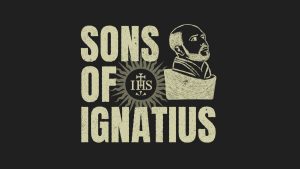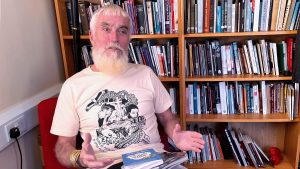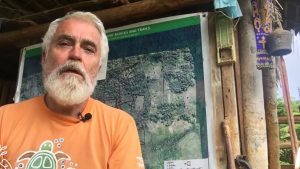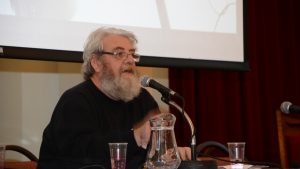World Day of Migrants
 ‘Floods of refugees’, ‘waves of migrants’, ‘immigration flow’… In an incisive article for World Day of Migrants and Refugees (18 January), Eugene Quinn, director of JRS Ireland, identifies a dehumanising tendency in our use of such “hydraulic metaphors”. “It is as if refugees and migrants are a wave that might drown us,” he writes. Taking his cue from the Pope’s message for the day of commemoration, he addresses the pivotal question: “How can we fail to take charge of all those, particularly refugees and displaced people, who are in conditions of difficulty and hardship?” Read the full text below.
‘Floods of refugees’, ‘waves of migrants’, ‘immigration flow’… In an incisive article for World Day of Migrants and Refugees (18 January), Eugene Quinn, director of JRS Ireland, identifies a dehumanising tendency in our use of such “hydraulic metaphors”. “It is as if refugees and migrants are a wave that might drown us,” he writes. Taking his cue from the Pope’s message for the day of commemoration, he addresses the pivotal question: “How can we fail to take charge of all those, particularly refugees and displaced people, who are in conditions of difficulty and hardship?” Read the full text below.
WORLD DAY OF MIGRANTS 2009
Eugene Quinn
In the Pope’s Message for the World Day of Migrants and Refugees 2009, celebrated on 18th January, he asks:
How can we fail to take charge of all those, particularly refugees and displaced people, who are in conditions of difficulty or hardship? How can we fail to meet the needs of those who are de facto the weakest and most defenceless, marked by precariousness and insecurity, marginalized and often excluded by society?
In these times of economic downturn this call to reach out to refugees, migrants and asylum seekers becomes more challenging. Upholding the right to seek and enjoy asylum involves committing scarce resources to people who are not ‘our own’. We become fearful. What if there is not enough to go round? Will migrant workers undercut wages and take our jobs? Will they ever leave?
Our perception of refugees and migrants is often shaped by images relating to water – ‘floods’, ‘waves’ and ‘flows’. Such hydraulic metaphors conjure a picture of vast hordes of people arriving at our shores unbidden and looking for their seat at our table. In the face of job losses and cutbacks, fears become more pronounced and are given expression. The National Consultative Committee on Racism and Interculturalism highlighted recently that the number of reported incidents of racism had grown significantly – from 66 in 2004 to almost 200 in 2008.
The metaphors we employ to refer to migrants and refugees serve to dehumanise them – to strip them of their individual identities and stories. But each person’s story is unique and each person’s circumstances are different. Too often, however, we are not interested in hearing these stories but instead think only of migrants and refugees as if they were a homogeneous collective. The images we employ give rise to fear and mistrust: it is as if refugees and migrants are a wave that might drown us. But it is not we who are drowning.
Every year hundreds of people fleeing persecution drown on their way from Africa to Spain or Italy. Hundreds more suffocate in sealed containers, starve in locked trucks or are injured by landmines between Turkey and Greece. Since 1993, there are over 8,000 documented deaths of people trying to enter Europe. These deaths are the consequence of a deeply divided and unequal world; they are the consequence also of border militarisation, unfair asylum laws, detention policies and carrier sanctions.
The reality of what forces people to leave their homes is worth remembering – conflict, violence, persecution and poverty arising from a world system that is not working. As the global economic crisis deepens, and climate change impacts more and more on the sustainability of life in poorer countries, the factors pushing people from their homelands are likely to increase.
The unspeakable horrors of the Second World War led to the adoption of the Universal Declaration of Human Rights on 10 December 1948. Article 14.1 proclaims: “Everyone has the right to seek and enjoy asylum from persecution in other countries”. However in the light of the recent sixtieth anniversary of the adoption of these principles, we need to be conscious that current policies adopted by the Irish Government and by the European Union are undermining the right to seek asylum. More restrictive border controls and policies are denying entry not only to those who are not entitled to enter, but also to many who would be entitled to asylum.
It is important and understandable that states protect the integrity of asylum systems. This includes measures to combat unfounded claims. However, if the net result of restrictive measures is that genuine asylum applicants are denied access to the territory, or to a fair hearing, then the human costs of such a policy approach are unacceptable.
It is worth remembering that richer countries, including Ireland, assume responsibility for only share a tiny proportion of the world’s refugees: the United Nations High Commissioner for Refugees (UNHCR) estimates that of the world’s 11.4 million refugees, only 1.4 million reside in industrialised countries. The vast majority of refugees flee to surrounding countries, many of which are among the poorest places on the planet.
In Ireland, applications for asylum fell to 3,866 in 2008 about a third of the level they were in 2002. Over four thousand people each year are already refused permission to land and are turned away at the border. It has been unofficially estimated that 10 per cent of those turned away may be asylum seekers. As the recession deepens, the allocation of scarce resources to those seeking asylum may be questioned and policymakers may be tempted to further restrict access to the territory. People seeking asylum may increasingly find there is ‘no room at the inn’.
As the Immigration, Residence and Protection Bill 2008 returns to the Dáil for its final consideration, there is an opportunity to reverse this trend. Without doubt, the Bill contains provisions that should lead to increased efficiency and be of considerable benefit to persons seeking asylum. Nevertheless, significant concerns exist in relation to access to the territory, border controls, detention, judicial review, humanitarian leave to remain and the removal process.
On the occasion of the World Day of Migrants and Refugees 2009 policymakers would do well to remember the lessons of sixty years ago and ensure that in Ireland the right of every person “to seek and enjoy asylum from persecution”, as proclaimed in the UN Declaration, is not watered down.
Eugene Quinn is National Director of Jesuit Refugee Service Ireland












